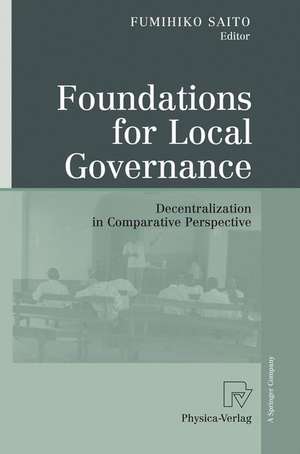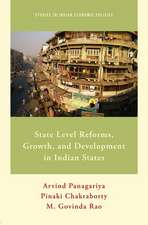Foundations for Local Governance: Decentralization in Comparative Perspective
Editat de Fumihiko Saitoen Limba Engleză Paperback – 4 ian 2008
Preț: 642.68 lei
Preț vechi: 756.09 lei
-15% Nou
Puncte Express: 964
Preț estimativ în valută:
122.97€ • 128.74$ • 101.75£
122.97€ • 128.74$ • 101.75£
Carte tipărită la comandă
Livrare economică 07-21 aprilie
Preluare comenzi: 021 569.72.76
Specificații
ISBN-13: 9783790820058
ISBN-10: 3790820059
Pagini: 300
Ilustrații: X, 301 p. 8 illus.
Dimensiuni: 155 x 235 x 19 mm
Greutate: 0.48 kg
Ediția:2008
Editura: Physica-Verlag HD
Colecția Physica
Locul publicării:Heidelberg, Germany
ISBN-10: 3790820059
Pagini: 300
Ilustrații: X, 301 p. 8 illus.
Dimensiuni: 155 x 235 x 19 mm
Greutate: 0.48 kg
Ediția:2008
Editura: Physica-Verlag HD
Colecția Physica
Locul publicării:Heidelberg, Germany
Public țintă
ResearchCuprins
Decentralization and Local Governance: Introduction and Overview.- Indonesia towards Decentralization and Democracy.- Entangled Democracy, Decentralization and Lifeworld in Flores under Global Trends.- Redesigning Local Governance in India: Lessons from the Kerala Experiment.- Contrasting Experiences of Decentralization in Two States in India.- Challenges of Moving into a Devolved Polity in Sri Lanka.- Politics and Local Government in Uganda.- Possibility of Creating a Deliberative Solution in Uganda.- Democratic Decentralization in Post-Apartheid South Africa.- The Challenges of Deepening Democracy in Post-Apartheid South Africa.- The Balance Sheet of Decentralization in Ghana.- Potential and Limitation of Local Radio in Information Accessibility in Ghana.- Conclusions.
Textul de pe ultima copertă
Various forms of decentralization are recently pursued in the world, including developing countries. However, there has not been a coherent framework to access these intended outcomes generated by decentralization measures implemented in Asian and African countries. This book provides such a framework based on comparative analyses of different experiences of decentralization measures in six developing countries, where the policy rationale to “bring services closer to people” originated in different socio-political backgrounds. Although decentralization measures are potentially useful for attaining both political democratization and economic efficiency, what is often packaged under the umbrella of “decentralization” needs to be disaggregated analytically. Successful reforms need coherent approaches in which a range of stakeholders would become willing to share responsibilities and resources in order to achieve the ultimate outcome of poverty reduction in the developing countries.
"Securing more effective, equitable and democratic local governance processes is a key challenge for the 21st century. This volume is a lucid and thought-provoking examination of decentralization in the global south which has clear relevance for all those who are concerned with local democracy and governance world wide."
Bob Evans, Director, Sustainable Cities Research Institute
Northumbria University, Newcastle Upon Tyne, UK
"Essential reading for students of governance. The book's actor framework permits detailed analyses of the case study countries and reveals the dangers of prescribing decentralization as a quick fix to improve service delivery and local democracy."
David Hulme, Director, Chronic Poverty Research Centre
University of Manchester, UK
"Securing more effective, equitable and democratic local governance processes is a key challenge for the 21st century. This volume is a lucid and thought-provoking examination of decentralization in the global south which has clear relevance for all those who are concerned with local democracy and governance world wide."
Bob Evans, Director, Sustainable Cities Research Institute
Northumbria University, Newcastle Upon Tyne, UK
"Essential reading for students of governance. The book's actor framework permits detailed analyses of the case study countries and reveals the dangers of prescribing decentralization as a quick fix to improve service delivery and local democracy."
David Hulme, Director, Chronic Poverty Research Centre
University of Manchester, UK
Caracteristici
Includes supplementary material: sn.pub/extras











